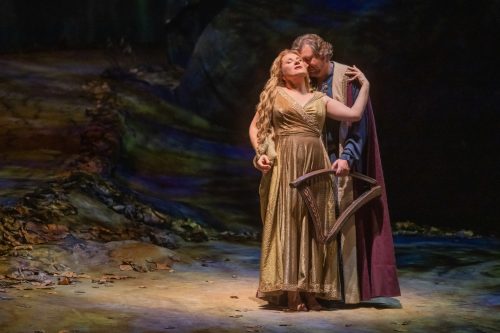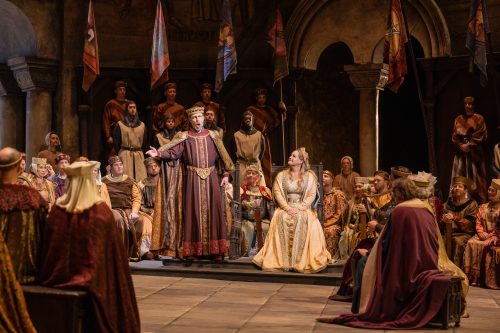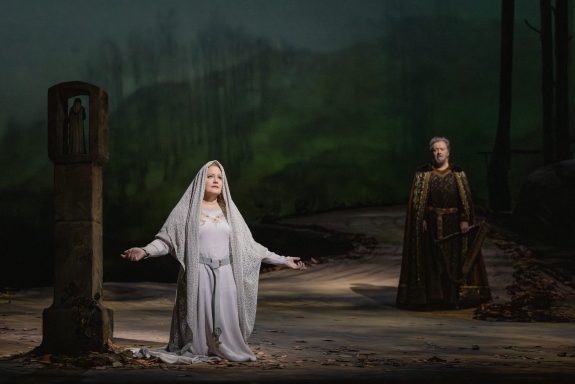 United States Wagner, Tannhäuser: Soloists, Chorus and Orchestra of the Metropolitan Opera, New York / Sir Donald Runnicles (conductor). Metropolitan Opera, New York, 6.12.2023. (TM)
United States Wagner, Tannhäuser: Soloists, Chorus and Orchestra of the Metropolitan Opera, New York / Sir Donald Runnicles (conductor). Metropolitan Opera, New York, 6.12.2023. (TM)

Production:
Direction – Otto Schenk
Revival director – Stephen Pickover
Sets – Günther Schneider-Siemssen
Costumes – Patricia Zipprodt
Lighting – Gil Wechsler
Choreographer – Norbert Vesak
Chorus master – Donald Palumbo
Cast:
Venus – Ekaterina Gruberova
Tannhäuser – Andreas Schager
Young Shepherd – Maureen McKay
Landgraf Hermann – Georg Zeppenfeld
Walther von der Vogelweide – Kyle van Schoonhoven
Biterolf – Le Bu
Wolfram von Eschenbach – Christian Gerhaher
Heinrich der Schreiber – Tony Stevenson
Reinma von Zweiter – Harold Wilson
Elisabeth – Elza van den Heever
Pages – Marcus Agrippa, Ariadne Chan-Miller, Davida Dayle, Mila DiPolo, Alexandra Niatsetskaya, Casey Schopflocher, Andrea Wang, Joelle Wee
Three Graces – Emery LeCrone, Ana Luiza Luizi, Sarah Weber-Gallo
Could there be something like a Tannhäuser ‘curse’? Wagner fretted until the end of his life about how to improve his first opera inspired by medieval German sources. Like a beckoning Venus, the work tempted him at various points in his life to return and tinker away at what he perceived as its imperfections. Wagner’s most significant revision, fashioned for his operatic debut in Paris in 1861, spurred the most humiliating fiasco of his mature career – not because of the ‘content’ but because of protests in part related to Napoleon III’s policies involving the Austrian Empire.
Another protest, also unrelated to the opera’s exploration of the tension between erotic and spiritual love, temporarily halted the opening night of the Met’s current revival of the production, originally staged for the company by Otto Schenk in 1977. As has been widely reported, the climate activists known as Extinction Rebellion staged a protest that stalled the performance midway through the second act. (A disruption by pro-Palestinian demonstrators might have been less surprising, at least to those familiar with the reception history of Tannhäuser – in particular, with the opera’s pivotal part in inspiring Theodor Herzl while writing his pamphlet The Jewish State.)
Thankfully, the performance I attended was allowed to unfold without interference. Indeed, far from showing any sign of a curse, this account made a persuasive case for a work that tends to be undervalued within the Wagner canon because of its proximity to the grand opera conventions the composer would later tear apart.
Schenk’s tradition-respecting production is anchored around an attempt to evoke the medieval German setting specified by Wagner – in other words, the nineteenth-century Romantic image of the period of troubadours and courtly romance. As seen in this revival, the production juxtaposes a visual feast of resplendent costumes and architectural illusionism, the setting for the grand spectacle of the troubadour contest at the center of Tannhäuser, with the shadow-covered mystery of the landscape surrounding Wartburg Castle and the mossy grottos of the supernatural Venusberg. It is in these spaces that the stakes regarding the title protagonist’s redemption play out.
The fact that the curtain remains closed for the Overture, without any stage fuss to interpret the music, gives a fair indication that we are heading into a ‘conventional’ production. When it opens, the Venusberg is revealed as an obscurely lit, multilevel paradis artificiel. Norbert Vesak’s choreography depicting the orgy under way seems curiously decorous and well-behaved in comparison with Wagner’s overcharged chromaticism and galloping rhythms.
A very long, wordless stretch passes before the entrance of any of the main characters. The absence of directorial intervention (or protest) to adjust the dramaturgy as laid out by Wagner leaves ample room for conductor Donald Runnicles and the excellent Met Orchestra to establish the coordinates of the opera from the pit. Indeed, Runnicles’s insights into the score complement a superbly well-balanced and incisively characterized cast of principals. In the performance I attended, musical values not only prevailed but were given scope to amplify and expand on the drama. Already with the Overture, Runnicles showed a keen sympathy with Wagnerian architecture, building points of tension carefully and accentuating how polarized are the musical environments in which Tannhäuser lives and breathes.
According to the musicologist and gambist Laurence Dreyfus (in his intriguing book Wagner and the Erotic Impulse), the composer’s reputation as a provocateur was initially associated with his unprecedented ability to translate desire and erotic longing into music, specifically in Tannhäuser. Runnicles tapped into the sense of destabilizing shock that accompanies the entrance of the Venusberg music, but in this account he seemed less interested in Wagner as sonic revolutionary than in the spiritual languor and striving expressed not only by Tannhäuser but by Elisabeth and Wolfram.
At times, it was as if Runnicles had uncovered in Tannhäuser a proto-Parsifal – nowhere more so than in the third act, which became the sustained highlight of the evening. He shaped its prelude into a tone poem of tormented pilgrimage – halting gestures conveyed the repentant singer’s painful sense of spiritual desolation – and then traced the long arc, with meticulous detail each step of the way, to Tannhäuser’s miraculous yet inevitable redemption. (Wagner himself had no patience with those who wanted to read this as a conventionally Christian, pious resolution but had in mind something closer to the longing ‘to transcend the senses’, as Harold Clurman once put it, that Tennessee Williams dramatized in such works as The Night of the Iguana – coincidentally playing at the same time in a new off-Broadway production by La Femme Theatre.) There were already hints of this in the lingering melancholy of the first choral entry in the long opening scene. Runnicles underscored the difference between the two stages of life in Venus’s realm: the erotic fever pitch and the over-satiated moment of rumination post-orgy, which sets Tannhäuser’s desire to flee the Venusberg in motion.
Andras Schager, returning to the Met following his debut as Siegfried, brought his huge, untiring tenor to the title role. He was quick to qualify his praise of Venus with confessions of his dissatisfaction and, from the start, seemed ill at ease in the domain of the goddess, sung with impatient, indeed all-too-human passion and vulnerability by Ekaterina Gubanova. Schager portrayed the possession that overtakes Tannhäuser in the middle of the Wartburg song contest – so soon after reaffirming his love for Elisabeth – with a believable depiction of mania, and his obtuse pride until he finally understands how deeply he has wounded her was especially effective. The tenor opened up to the character’s fuller dimensionality in a harrowingly powerful rendering of the ‘Rome Narration’, impressively writing over his youthful ardor with harsh tonal accents in the most forward-looking passage of Wagner’s score.

Elza van den Heever drew out the multiple layers of Elisabeth’s character with her assured, gleaming upper range and intensely expressive phrasing and acting. Her opening aria brimmed with a palpable joy in its bounding lyricism that had an antipode in her profoundly moving final scene as she barely chased away doubt and dejection over Tannhäuser’s failure to return with new resolve. Most intriguing of all was the moment of being wounded by the errant knight’s praise of Venus that van den Heever showed in Act II, making it clear that the opera is not solely concerned with Tannhäuser’s need to make sense of his experience. She brought out the sympathetic, even tender, side of her otherwise unbending father, Landgraf Hermann, sung with steely power by Georg Zeppenfeld.
Making his Met debut as fellow troubadour Wolfram, Christian Gerhaher was among the cast’s strongest assets. The celebrated lieder interpreter mined every phrase for maximal impact without indulging in mannerism. He seemed so invested in Wolfram’s worldview that his solo scenes became new centers of gravity: the painful longing and hard-earned solace he revealed in ‘O du mein holder Abendstern’ was worth the price of admission. Dramatically, his Wolfram conveyed persuasive concern for his friend Tannhäuser and compassion for Elisabeth.
Other especially notable contributions came from Maureen McKay as the young shepherd, the purifying first sound Tannhäuser hears upon his return to ‘reality’, and Le Bu as the violence-prone Biterolf. Prepared by Donald Palumbo, the Met Opera Chorus gave a first-rate performance of the extensive and integral choral parts.
Thomas May
Featured image: Georg Zeppenfeld (Hermann) and Elza van den Heever (Elisabeth) © Evan Zimmerman/Met Opera
